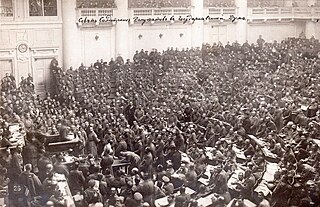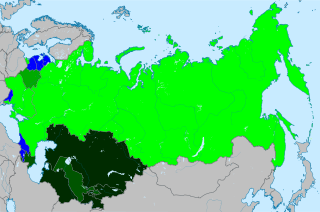Russian(s) refers to anything related to Russia, including:
African or Africans may refer to:

The president of the Soviet Union, officially the president of the Union of Soviet Socialist Republics, abbreviated as president of the USSR, was the head of state of the Union of Soviet Socialist Republics from 15 March 1990 to 25 December 1991.
The 1936 Constitution of the Soviet Union, also known as the Stalin Constitution, was the constitution of the Soviet Union adopted on 5 December 1936.
The 1977 Constitution of the Soviet Union, officially the Constitution of the Union of Soviet Socialist Republics, was the constitution of the Soviet Union adopted on 7 October 1977.

The Constitution of the Russian Federation was adopted by national referendum on 12 December 1993. Russia's constitution came into force on 25 December 1993, at the moment of its official publication, and abolished the Soviet system of government. The current Constitution is the second most long-lived in the history of Russia, behind the Constitution of 1936.

A soviet was a workers' council in the late Russian Empire, primarily associated with the Russian Revolution, which gave the name to the latter state of the Soviet Union.

The Union State, or Union State of Russia and Belarus, is a supranational union consisting of Belarus and Russia, with the stated aim of deepening the relationship between the two states through integration in economic and defence policy. Originally, the Union State aimed to create a confederation; however, both countries currently retain their independence. The Union State is based on a previous international treaty between Russia and Belarus made on 2 April 1997. Although it consists of only Russia and Belarus, other countries are allowed to join. The supranational union is ruled through the Supreme State Council and other governing bodies. As of 2024, the current president of the Supreme State Council of the Union is Alexander Lukashenko, who has held the position since 2000. The present goal of the Union State mainly focuses on economic integration, taxation, and integration of defence and intelligence apparatus.
State Council may refer to:

The political system of the Soviet Union took place in a federal single-party soviet socialist republic framework which was characterized by the superior role of the Communist Party of the Soviet Union (CPSU), the only party permitted by the Constitution.
Supreme Council may refer to:

The Order of Friendship of Peoples was an order of the Soviet Union, and was awarded to persons, organizations, enterprises, military units, as well as administrative subdivisions of the USSR for accomplishments in strengthening of inter-ethnic and international friendship and cooperation, for economical, political, scientific, military, and cultural development of the Soviet Union.

The Checheno-Ingush Autonomous Soviet Socialist Republic, abbreviated as the Checheno-Ingush ASSR, was an autonomous republic within the Russian Soviet Federative Socialist Republic, in existence from 1936 to 1944 and again from 1957 to 1993. Its capital was Grozny. The 1979 census reported the territory had an area of 19,300 square kilometres (7,500 sq mi) and a population of 1,155,805 : 611,405 Chechens, 134,744 Ingush, and the rest were Russians and other ethnic groups.

The Constitution of the Republic of Belarus is the ultimate law of Belarus. The Constitution is composed of a preamble and nine sections divided into 146 articles.

The Belovezha Accords is the agreement declaring that the Union of Soviet Socialist Republics (USSR) had effectively ceased to exist and establishing the Commonwealth of Independent States (CIS) in its place as a successor entity. The documentation was signed at the state dacha near Viskuli in Belovezhskaya Pushcha, Belarus on 8 December 1991, by leaders of three of the four republics which had signed the 1922 Treaty on the Creation of the USSR:
European, or Europeans, may refer to:

The Declaration "On the Restoration of Independence of the Republic of Latvia" was adopted on 4 May 1990 by the Supreme Soviet of the Latvian SSR in which Latvia declared independence from the Soviet Union. The Declaration stated that, although Latvia had de facto lost its independence in 1940, when it was annexed by the Soviet Union, the country had de jure remained a sovereign country as the annexation had been unconstitutional and against the will of the Latvian people.

A referendum on the future of the Soviet Union was held on 17 March 1991 across the Soviet Union. It was the only national referendum in the history of the Soviet Union, although it was boycotted by authorities in six of the fifteen Soviet republics.

The Supreme Soviet was the common name for the legislative bodies (parliaments) of the Soviet socialist republics (SSR) in the Union of Soviet Socialist Republics (USSR). These soviets were modeled after the Supreme Soviet of the USSR, established in 1938, and were nearly identical.

The Government of the Union of Soviet Socialist Republics (USSR) was the executive and administrative organ of the highest body of state authority, the All-Union Supreme Soviet. It was formed on 30 December 1922 and abolished on 26 December 1991. The government was headed by a chairman, most commonly referred to as the premier of the Soviet Union, and several deputy chairmen throughout its existence. The Communist Party of the Soviet Union (CPSU), as "The leading and guiding force of Soviet society and the nucleus of its political system" per Article 6 of the state constitution, controlled the government by holding a two-thirds majority in the All-Union Supreme Soviet. The government underwent several name changes throughout its history, and was known as the Council of People's Commissars from 1922 to 1946, the Council of Ministers from 1946 to 1991, the Cabinet of Ministers from January to August 1991 and the Committee on the Operational Management of the National Economy from August to December 1991.











